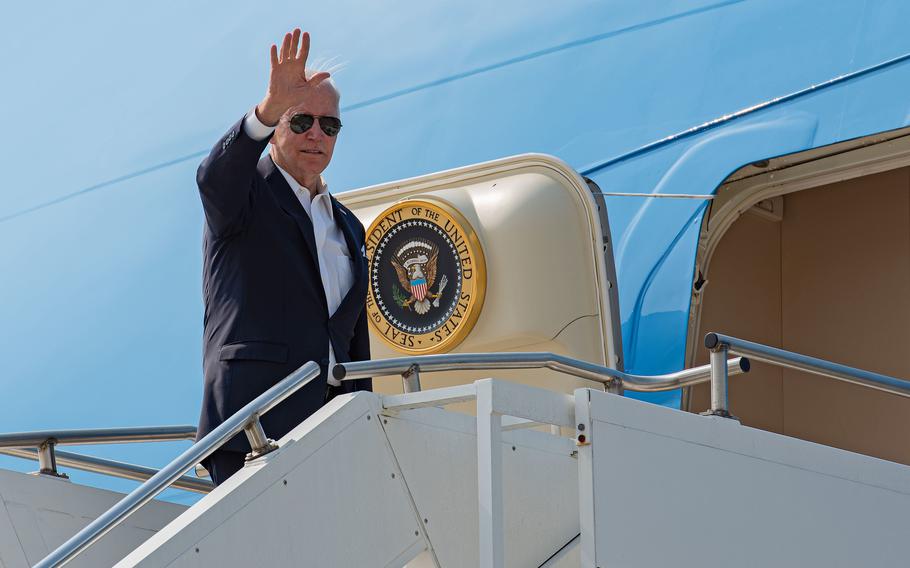
Air Force One touched down in the seaside city of Jeddah Friday evening, just the second time a U.S. president has arrived on a direct flight from Israel to Saudi Arabia. He was greeted at the airport by Prince Khalid Al-Faisal, a senior royal who’s governor of Mecca, and Princess Reema bint Bandar, the Saudi ambassador to the U.S., on the purple carpet reserved for important guests. (Allison Payne/Air Force)
President Joe Biden arrived in Saudi Arabia on Friday eager to reset relations with a nation that has proven to be more pivotal to his political future than he anticipated.
Air Force One touched down in the seaside city of Jeddah Friday evening, just the second time a U.S. president has arrived on a direct flight from Israel to Saudi Arabia. He was greeted at the airport by Prince Khalid Al-Faisal, a senior royal who’s governor of Mecca, and Princess Reema bint Bandar, the Saudi ambassador to the U.S., on the purple carpet reserved for important guests.
The itinerary was choreographed by the White House to amplify the chief accomplishment of Biden’s trip so far -- an announcement by Saudi Arabia that it will open its airspace to all carriers, including those from Israel.
The decision means flights from Asia to Israel will no longer need to make lengthy detours. The U.S. has encouraged Israel and Arab countries to bolster their cooperation to better counter Iran’s regional influence.
The need for a political win only grew more acute overnight after Sen. Joe Manchin, the West Virginia Democrat and crucial swing vote in an evenly divided U.S. Senate, announced he wouldn’t support Biden’s full economic legislative package. That effectively killed Biden’s hopes for a bill that would have raised taxes on the wealthy and corporations and invested significantly in programs to combat climate change.
But while the announcement provided some diplomatic momentum, the ultimate success of Biden’s trip will hinge on the tightly choreographed meeting Friday with Crown Prince Mohammed bin Salman. Part of that meeting is open to the media, ensuring images of the pair as diplomatic equals.
The event represents a significant reversal for Biden, who said during the 2020 presidential campaign he would make Saudi Arabia “a pariah” over the 2018 murder of Washington Post columnist Jamal Khashoggi. As president, Biden released an intelligence report indicating the crown prince had ordered the killing.
Aides said at the time that Biden wouldn’t engage directly with Prince Mohammed - the de facto ruler of the country - and instead would work with King Salman, the 86-year-old ruler who has largely ceded leadership to his son. The U.S. also moved to cut off offensive weapons sales to the kingdom.
But the White House has sought to repair the relationship, particularly after Russia’s invasion of Ukraine exacerbated already elevated oil prices. The U.S. will ask Saudi Arabia and the UAE to tap unused oil production capacity, which could help combat the highest inflation readings in four decades.
Biden also declined to commit to explicitly raising the issue of Khashoggi’s murder with the crown prince, saying Thursday that he would only pledge to generally bring up the issue of human rights.
“My position on Khashoggi has been so clear,” Biden said. “If anyone doesn’t understand it, in Saudi Arabia or anywhere else, then they haven’t been around for a while.”
The combination amounted to a clear message that the White House was ready to turn the page with Saudi leadership.
People familiar with the ongoing negotiations between the U.S. and Saudi Arabia say they don’t expect Biden to leave the country with a public announcement on increasing oil supply.
U.S. and Saudi officials have been in touch on the issue of energy markets, and discussions will continue regarding output from members of the OPEC+ cartel, one of the people said, asking not to be named because the deliberations aren’t public.
The lack of an immediate deliverable doesn’t mean Biden’s efforts will go to waste. White House aides said before the trip that any energy announcements could take time to come to fruition, and Saudi leaders have said they want to manage any production changes through the broader OPEC process.
“I don’t think it’s going to be measured on Friday or Saturday of this week; I think it will be measured over the weeks and months to come,” U.S. national security adviser Jake Sullivan told reporters on Monday.
Still, the White House is likely hoping to make other announcements to blunt criticism from activists and fellow Democrats at home who argue Biden shouldn’t engage with Saudi Arabia. Israeli and Saudi diplomats have discussed the possibility of expanding the limited clandestine relations they currently engage in for trade and military partnerships, according to people familiar with the matter.
Biden will meet Saturday with the Gulf Cooperation Council and other Arab allies, and is hoping to shore up the fragile ceasefire between Saudi Arabia and Houthis in Yemen.
The group is also expected to discuss a regional air defense system - which could include information and technology sharing from Israel - as well as cybersecurity and continued U.S. efforts to re-enter a deal with Iran aimed at preventing the development of a nuclear weapon.